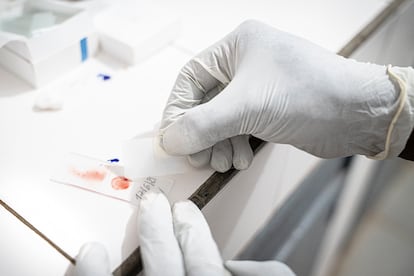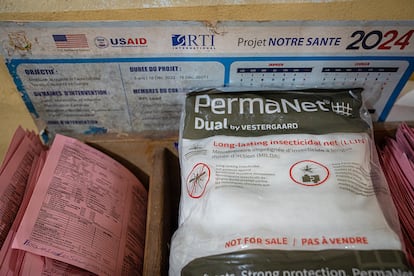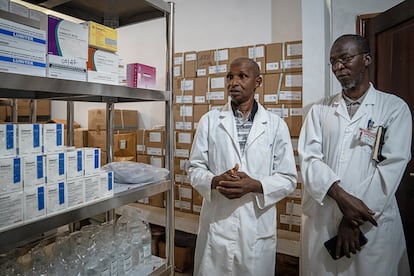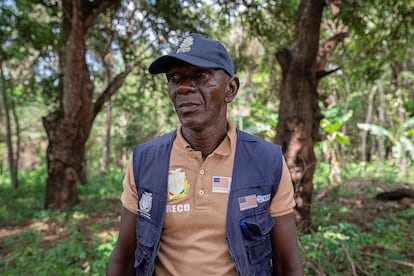"I'm begging you, Donald Trump. People are going to die!": USAID funding cuts threaten two decades of malaria control in Guinea.

One morning in mid-June, 10-year-old Mohamed Camara lay in a bed at a health center in the small Guinean town of Tamita, wearing bright blue shorts and a military-style T-shirt. He looked feverish, with small beads of sweat running down his forehead. He had just been diagnosed with malaria . That morning, Mohamed's parents had taken him to the center. Now, they and his little sister sat on the bed next to him, looking distressed. "We were very worried," recalls his father, Alseny Camara.
Just six months earlier, Mohamed's parents would have been able to call a community health worker . That person would have come to the Camaras' home on a motorcycle, taken a drop of blood, and applied it to a rapid diagnostic test. After a positive result, the health worker would have given the boy an initial dose of medication and explained to his parents how to continue treatment. If the symptoms had been severe, Mohamed would have been referred to a health center.
But that hasn't happened, because in Guinea-Conakry, where the entire population of more than 14 million is at risk of malaria, thousands of community workers lost their jobs after the US suddenly froze billions of dollars in foreign aid in January, just days after President Donald Trump took office.
Community health workers—people who provide some primary care services but lack specialized training—are an essential part of the health care system in many African countries and are especially important in the fight against malaria , where a few days' delay in diagnosis and treatment can mean the difference between life and death.
Mohamed was lucky that his parents were able to take him to the health center and that he didn't have a severe case of malaria. Malaria, caused by a mosquito-borne parasite, can infect the brain and cause anemia and life-threatening organ failure. When he arrived at the health center, he was given a combination of medications and recovered, according to his doctor. But other parents may not have the means to take their children to the doctor, or not in time, says the center's director, Aïssata Camara. (She is not related to the boy; many people in this part of Guinea have the surname Camara.)

The freeze in US funding for malaria control in Guinea—which was estimated at around $15 million in 2024, or about €12.8 million—has disrupted or jeopardized many other health services in the West African country, including diagnostic testing, the provision of medicines and long-lasting insecticide-treated bed nets, as well as data collection, technical support, and training. The Trump administration has ended much of the work of the Presidential Malaria Initiative (PMI), which funded malaria control efforts for approximately half of Guinea's population. The US has also threatened to reduce its contribution to the Global Fund to Fight HIV, Tuberculosis, and Malaria, which funds efforts in the rest of the country.
Nouman Diakité, director of monitoring and evaluation for Guinea's National Malaria Control Program, believes there's no doubt the country will see an increase in malaria cases and deaths . "It's already started," he says. Children under five, who account for about three-quarters of malaria deaths, and pregnant women will be the most affected.
Malaria outbreaks are expected in dozens of other African countries where PMI provided support. In a paper published in The Lancet in June , researchers estimated that if PMI had continued as usual, it would have prevented 13.6 million malaria cases and 104,000 deaths in sub-Saharan Africa this year, including 250,000 cases and 450 deaths in Guinea.
Not all of those achievements will be lost, as some US funding for malaria control continues. The United States Agency for International Development (USAID), where PMI was located, has been dissolved , and nearly all of its employees have been laid off. However, in a July 25 email, a US State Department spokesperson states that there is a commitment to “ensure a seamless integration of USAID’s lifesaving global health programs into the State Department” and adds that this transition “is well underway.”
Still, public health experts predict malaria cases will skyrocket in the coming years, as diminished mosquito control efforts allow malaria transmission to rebound. “It’s a tragedy,” says Regina Rabinovich, former director of the Bill & Melinda Gates Foundation’s infectious diseases division.
The United States has played a major role in the global fight against malaria for two decades. Until recently, it provided about 65% of international funding to combat the disease, according to an analysis by KFF, a U.S. nonprofit health policy organization. Much of the remainder came from the Global Fund, about a third of whose budget also came from the U.S. government.

The PMI was launched in 2006, during the George W. Bush presidency. It marked the beginning of a golden era for malaria control, according to Richard Steketee, who served as PMI's deputy global malaria coordinator in the US from 2018 to 2023. The Global Fund, the World Bank, and the Bill & Melinda Gates Foundation joined the fight. The PMI's budget grew to nearly $800 million by 2024, or more than €685 million, providing support to 27 countries in sub-Saharan Africa.
One of the hotspots is Guinea, which had an estimated 4.4 million cases and more than 10,000 deaths in 2023, according to the World Health Organization (WHO) . Every year, in late May or June, when the rainy season causes puddles and ponds to form, Anopheles mosquitoes swarm and bite, and feverish patients fill clinics. Children, whose immune systems have not yet learned to fight off the parasites, are at much greater risk. In 2005, about one in six children born in Guinea died before their fifth birthday, many of them from malaria.
US aid soon began to turn things around. Thanks to the joint efforts of PMI and the Global Fund, insecticide-treated bed nets, virtually nonexistent 20 years ago, have been widely introduced. More than 1.1 million children under five now receive anti-malarial drugs each month during peak transmission, a strategy called seasonal chemoprevention. About half of the country's pregnant women, whose immune systems are temporarily weakened, receive at least three doses of a combination drug that protects the mother from malaria and reduces the risk of miscarriage, stillbirth, premature birth, and low birth weight.
Measuring program success is not easy. In most African countries, many malaria cases and deaths occur at home and go unreported. However, a key indicator is prevalence, typically measured as the percentage of randomly selected children between six months and five years of age who have malaria parasites in their blood. In Guinea, that figure fell from 44%—in a 2012 national survey—to 17% in 2021. Child mortality fell by a third between 2005 and 2018. “Guinea has truly made tremendous progress,” says Richard Reithinger, a former distinguished fellow at RTI International, a US-based nonprofit that implemented the PMI-funded programs.
Now, chaos and uncertainty reign since Trump ordered a 90-day pause in foreign aid on Inauguration Day in January. Guinea was asked to halt USAID-funded activities. After a review, the State Department unfroze some “vital” malaria funds, including those for medicines and bed nets. However, a KFF analysis revealed that 80% of the 157 USAID contracts that included malaria activities were terminated. RTI International laid off nearly all of its local staff in Guinea—about 60 people, according to Reithinger.
Ibrahima Kankalabé Diallo, the top health official in the town of Boffa, lists 15 initiatives the US had supported that have been halted or are in jeopardy. These include payments to community health workers, 378 in his district alone; the provision of essential medicines, computers, microscopes, and motorcycles; monthly meetings with the directors of the prefecture's health centers; and a high-level meeting on World Malaria Day to raise awareness. "Nothing is the same as before," Diallo says.

Fakouma Camara, a biologist based in Boffa, was one of five Guinean experts certified by the WHO to diagnose malaria using a microscope, thanks to training provided by the PMI. He had gone on to work as a trainer, teaching community health workers across the country how to use rapid diagnostic tests and laboratory technicians how to diagnose using a microscope. Now he is out of work, and the training program has collapsed.
At Dubréka Hospital, more than half of the admissions in June were for malaria. In a warehouse, the hospital's chief pharmacist, Alpha Baldé, points to the dwindling piles of boxes containing medicines. He worries that they won't be replenished.
Guinea is not the only country in this situation. In April, a WHO rapid assessment revealed that more than half of the 64 malaria-endemic countries had experienced moderate or severe disruptions to disease control services. “There is panic in many countries,” says Maru Aregawi Weldedawit of the WHO Global Malaria Programme. Reithinger says the greatest problems would occur in countries such as Nigeria, the Democratic Republic of Congo (DRC), Ethiopia, and Mozambique, where the malaria burden was already high and funding for disease control was insufficient even before the US cuts.
Alhassane Camara, community health worker in Keleya
The future of US support for the fight against malaria is uncertain. In its email, the State Department emphasizes that “PMI’s key lifesaving activities in malaria prevention and treatment continue.” It states that at least 10 contracts continue to provide commodities to PMI partner countries, including more than 3 million insecticide-treated bed nets in the DRC and Ethiopia and seasonal chemical prevention for more than 7 million children in West Africa. However, from now on, all aid will be managed by the State Department, and many fear that, with the existing aid structure in tatters and thousands of staff laid off, the department will have to start from scratch. The fate of the Global Fund is also uncertain, as the US and other countries are reducing their commitments.
I know the Guinean health system and have seen how it withstood and emerged from the Ebola crisis , and how it managed the COVID crisis. I believe the system has enormous resilience.Richard Reithinger, former RTI International Distinguished Research Fellow
Low- and middle-income countries will have to spend more of their own money on the fight against malaria. Guinea is rich in resources and one of the world's largest producers of bauxite. If just 1% of the revenue from that industry were allocated to health, the country could take charge of the fight against malaria, says Alioune Camara, coordinator of the National Malaria Control Program. He says he has already raised this issue with the government. "Will they do it? That's the big question now."
Reithinger is “cautiously optimistic” about Guinea’s future. “I think we tend to underestimate the governments of countries,” he says. “I know the Guinean health system and have seen how it withstood and emerged from the Ebola crisis , and how it managed the COVID crisis. I think the system has enormous resilience.”
But at the Tamita health center, where new malaria patients arrived almost daily, too much was falling by the wayside, according to its director, Aïssata Camara. “Continuity is at risk,” she says. “We want American support to return.”

Like her, many people in Guinea feel abandoned by a once reliable partner. Alhassane Camara, a community health worker in Keleya, still wears a polo shirt and vest with American flags and the USAID logo, along with the agency's motto: "Of the American people." He has lost his income—about $50 a month—and his motorcycle, and although he continues to help families close to his home, he can no longer reach those who lived farther away.
Camara's eyes fill with tears, and in an emotional outburst, he suddenly switches from French, Guinea's official language, to broken English. "I'm begging you, Donald Trump. People are going to die !" he shouts. "Little children are going to die!"
EL PAÍS





